Contents
Overview
In this post we describe some of the plants we saw on the REI Machu Picchu 10-Day Lodge Trek over Christmas 2013 (December 21 – 29). Keep in mind that we were observing plants at the start of the rainy season. And, in general, the plants we describe here are ones that could easily be seen along roads, trails, and in gardens.
Background:
- In this post, Resources for Understanding the Plants of Peru and Machu Picchu, we all the references we used to identify plants in this. In particular, references [1] – [4] (below) were very useful.
- In the post, Machu Picchu 10-Day Lodge Trek, Salcantay Route, we talk about the REI Machu Picchu 10-Day Lodge Trek on which we saw most of these plants. We basically went from Mollepata to Machu Picchu. Before the trek, we spent some time in Cusco and include plants we saw there as well.
- A word about photos. Most of the photos we include images of the plant where we saw it. In a few cases, we didn’t see the plant, but experienced it in other ways, like through its fruits or some product made from it. Even though indirect, it is still an important way of experiencing some of the important plants of this region, and so we include them here as well.
- A word about spelling. We slip back and forth between local and hispanicized names for some place names – it’s a hard habit to break.
- Salkantay (with a “k”) –> Salcantay (with a “c” – hispanicized)
- Saksaywaman –> Sacsayhuaman (hispanicized)
- Llaqtapata (with a “q”) –> Llactapata (with a “c”)
Format for picture descriptions:
- Scientific Name: The scientific name for the plant. In some cases we are referring to a synonym, but with the Tropicos link you can find the accepted name. In identifications where we are uncertain of the species, we use a question mark (?).
- Common Name: The local name is included if someone mentioned it to us, or we learned about the plant using its common name.
- Family: The family to which the plant belongs. Families are a good way to organize your thinking. See for example, the book Botany in a Day: The Patterns Method of Plant Identification (1996) by Thomas J Elpel.
- Where: The approximate location where we saw the plant. Specific GPS coordinates are shown, if available, in photo captions. GPS coordinates are given as [13.1631 S, 72.5456 W], which is, for example, the GPS coordinates for Machu Picchu in degrees. However, upon reviewing where we thought the pictures were and the coordinates recorded, they are not 100% accurate. (We were using a Canon GPS receiver.)
- Notes: Information about where we saw the plant, the environment, frequency, or other thoughts about the plant.
- Links: Links to Wikipedia, EOL, and Tropicos. [es] = Wikipedia in Spanish, [qu] = Wikipedia in Quechua.
References
[1] Flowers of the Inca Trail by Oscar Olazábal Castillo
[2] Flores Silvestres de la Cordillera Blanca (Wildflowers of the Cordillera Blanca) by Helen and Kees Kolff
[3] Flowers of Machu Picchu, Including orchids (Flores de Machu Picchu, Incluye orquídeas) by Gino Cassinelli Del Sante and Daniel Huamán Chang
[4] Field Musem Plant Guides - Rapid Color Guides (plants/Peru) from the Field Museum, Chicago
[5] Ethnobotany of Chinchero, an Andean Community in Southern Peru. Fieldiana Botany, New Series No. 24, 1-126.
Plant List
Dec 19-20, Cusco
Scientific Name: Eucalyptus globulus
Common Name: Eucalipto
Family: Myrtaceae
Where: All around Cusco, in the hills.
Notes: We were surprised at how much this tree dominates the landscape in and around Cusco. On subsequent days we would continue to see Eucalyptus.
Links: Wikipedia, EOL, Tropicos
Left: View Over Cusco from Sacsahuman with Eucalyptus Trees; Right: Eucalyptus Tree in Mollepata
Left: Eucalyptus at Q’enqo (above Cusco) [13.5086 S, 71.9705 W]; Right: View of Cusco from Q’enqo with Eucalyptus
Scientific Name: Pouteria lucuma
Common Name: Lucuma
Family: Sapotaceae
Where: At El Mercado breakfast. Lucuma blended with milk and vanilla into a milkshake.
Notes: Never saw this fruit before. Had a milkshake of lucuma, milk, and a touch of vanilla.
Links: Wikipedia, EOL, Tropicos
Lucuma Fruit at El Mercado Hotel in Cusco
Scientific Name: Minthostachys mollis
Common Name: Muña
Family: Lamiaceae
Where: In Museo de Plantas Sagradas, Magicas y Medicinales. It was also pointed out to us at Q’engo.
Notes: We drank a lot of muña tea.
Links: Wikipedia, EOL, Tropicos
Scientific Name: Salvia oppositiflora
Common Name: Ñucchu
Family: Lamiaceae
Where: In Museo de Plantas Sagradas, Magicas y Medicinales, Saqsayhuaman, elsewhere.
Notes: These flowers are thrown at Christ figures when paraded through the streets. The dark color of the Christ in Capilla del Señor de los Temblores is said to be due to the repeated contact of flowers on the wood.
Links: Wikipedia, EOL, Tropicos
Left: Muña - Minthostachys mollis ; Right: Ñucchu - Salvia oppositiflora
Scientific Name: Buddleja longifolia syn. of B. incana
Common Name: Quiscuar, kiswar
Family: Buddlejaceae
Where: In Museo de Plantas Sagradas, Magicas y Medicinales.
Notes: We never saw this in the wild.
Links: Wikipedia, EOL, Tropicos
Quiscar - Buddleja longifolia
Scientific Name: Escallonia micrantha
Common Name: Chachacomo
Family: Escalloniaceae
Where: In Museo de Plantas Sagradas, Magicas y Medicinales.
Notes: We never saw this in the wild.
Links: Wikipedia, EOL, Tropicos
Escallonia micrantha at the Museo de Plantas Sagradas, Magicas y Medicinales
Scientific Name: Cantua buxifolia
Common Name: Cantuta
Family: Polemoniaceae
Where: We first saw it in Cusco, Plaza de Armas and in later days on the Salcantay trail.
Notes: National flower of Peru.
Links: Wikipedia, EOL, Tropicos
Cantuta - Cantua buxifolia – in Plaza de Armas, Cusco
Scientific Name: Polylepis spp.
Common Name: Queuña
Family: Rosaceae
Where: All of the photos here were in and around Cusco.
Notes: Maybe we saw in the wild, but it wasn’t obvious to us.
Links: Wikipedia, EOL, Tropicos
Polylepis Trees: Left and Center: Sacsayhuman; Right: Plaza Regocijo
Dec 21, Cusco to Salcantay Lodge
Scientific Name: Caesalpinia spinosa (syn. C. tinctoria)
Common Name: Tara
Family: Fabaceae
Where: At Limatambo/Tarawasi ruins halfway between Cusco and Mollepata. The archeological site is named for this tree.
Notes: The town/ruins are named for this plant. "Wasi" means “house” in Quechua. Used as a source of tannin.
Links: Wikipedia, EOL, Tropicos
Left: Tara Pods at the Museo de Plantas Sagradas, Magicas y Medicinales; Center and Right: A Tara Tree at Tarawasi
Scientific Name: Opuntia ficus-indica
Common Name: Tuna
Family: Cactaceae
Where: At Limatambo/Tarawasi.
Notes: Complete with Dactylopius (see Binomen Art – Dactylopius)
Links: Wikipedia, EOL, Tropicos
Left: Opuntia ficus-indica at Tarawasi, Wall with Niches; Right: Opuntia ficus-indica Flower
Scientific Name: Schinus molle
Common Name: Molle
Family: Anacardiaceae
Where: Around Mollepata.
Notes: The name of the town of Mollepata comes from combining Molle (the name of this tree) and pata (high or elevated ground). As we approached Mollepata, there were indeed many molle trees along the roadside. But heck if we thought to take a decent photo.
Links: Wikipedia, EOL, Tropicos
Scientific Name: Ambrosia peruviana
Common Name: Marcco, ajenjo
Family: Asteraceae
Where: In Mollepata, where we bought hats at ASOCIACIÓN DE ARTESANAS LLANKASUNCHIS WIÑARINAPAQ TEJIDO DE PUNTO MOLLEPETA (HANDMADE TEXTILES), we saw this plant again in a garden. Previously we saw it Sacsayhuman.
Notes: In Mollepata, a man gave us the common name Marcco.
Links: Wikipedia [es], EOL, Tropicos
Marcco - Ambrosia peruviana. Left: At Sacsayhuman. Center and Right: Mollepata [13.5089 S, 72.5266 W]
Scientific Name: Begonia veitchii
Common Name: Begonia
Family: Begoniaceae
Where: We started to see these begonia as we started our way to Salcantay lodge from just outside of Mollepata.
Notes: Flower color varies from white to deep pink. At Machu Picchu, we saw a begonia growing on a wall. Our guide indicated that UNESCO does not like plants growing in/on walls.
Links: Wikipedia, EOL, Tropicos
Begonia veitchii [ 13.4443 S, 72.5489 W – Left Photo]
Scientific Name: Sambucus peruviana syn. Sambucus nigra
Common Name: Elderberry
Where: On way to Salkantay Lodge.
Notes: The tree in the picture is on a farm. We did not get close to it.
Links: Wikipedia, EOL, Tropicos
Scientific Name: Berberis spp. References [1] and [2] have it as Berberis lutea.
Common Name: Checche
Family: Berberidaceae
Where: We started to notice this bush on the hike to Salkantay lodge and then afterward all the way to the Colpa Lodge.
Notes: Holly-like leaves make this relatively easy to spot. Blue berries.
Links: Wikipedia, EOL, Tropicos
Left: Elderberry Tree [13.4334 S, 72.558 W]; Right: Berberis spp.
Scientific Name: Berberis commutata
Common Name: T’ankar
Family: Berberidaceae
Where: We started to notice this bush on the hike to Salkantay lodge. Then, from the Wayra to the Colpa Lodge, we continued to see it.
Notes: Yellow flowers and blue/purple berries at first make you think you are seeing two different plants. Links: Wikipedia [qu], EOL, Tropicos
Berberis commutata – leaves, berries, flowers [13.4319 S, 72.5619 W]
Scientific Name: Baccharis latifolia or B. lanceolata
Common Name: Chilca
Family: Asteraceae
Where: Near Salcantay lodge.
Notes: Pretty common around the lodge.
Links: Wikipedia [es], EOL, Tropicos
Chilca Near Salcantay Lodge (30 feet from entrance)
Dec 22, Humantay Lake Hike
Scientific Name: Brugmansia sanguinea (Datura sanguinea)
Common Name:
Family: Solanaceae
Where: Inner court yard of Salkantay lodge. Also, in Museo de Plantas Sagradas, Magicas y Medicinales.
Notes: We had never seen the fruits on this plant, and they were bigger than expected.
Links: Wikipedia, EOL, Tropicos
Left: Brugmansia in the Center Courtyard of Salkantay Lodge; Right: Brugmansia at Museo de Plantas Sagradas, Magicas y Medicinales
Scientific Name: Urtica dioica
Common Name: Hortiga (Kisa in Quechua which means itchy.)
Family: Urticaceae
Where: In pastures on way to the Humantay lake.
Notes: Silly me, I tried a little between my thumb and index finger, thinking it was mint, and it stung for hours later. The shaman with us tried to warn me.
Links: Wikipedia, Wikipedia [qu], EOL, Tropicos
Stinging Nettle, Pasture Below Laguna de Humantay
Scientific Name: Astragalus lusitanicus
Common Name: Jusqa, Orqo grabanzo, El Garbanzillo
Family: Fabaceae
Notes: Very prevalent in pasture, over-grazed area.
Where: Pasture below Humantay Lake.
Links: Wikipedia [es], EOL, Tropicos
Astragalus lusitanicus, Pasture Below Laguna de Humantay
Scientific Name: Castilleja spp.
Common Name: Paintbrush
Family: Orobanchaceae (Broomrape)
Where: On way to Humantay Lake and then to Salkantay Pass from Salkantay lodge. After passing over into the high jungle, didn’t see it at all.
Notes: Shorter and closer to the ground than paintbrush we see in Northwest.
Links: Wikipedia, EOL, Tropicos
Castilleja, Pasture Below Laguna de Humantay, Center Photo [13.3834 S, 72.582 W]
Scientific Name: Stipa ichu
Common Name: Ichu
Family: Poaceae
Where: Near Humantay Lake was the first time we saw it. Later, near the Salkantay pass (December 23) and then not as much we descended to Wayra Lodge.
Notes:
Links: Wikipedia, EOL, Tropicos
Left: Ichu Near Laguna de Humantay; Center: Ichu at Soyroccocha; Right: Ichu Near Salkantay Pass [13.3627 S, 72.5601 W]![Ichu Near Salkantay Pass [13.3627 S, 72.5601 W] Ichu Near Salkantay Pass [13.3627 S, 72.5601 W]](https://blogger.googleusercontent.com/img/b/R29vZ2xl/AVvXsEguFHzD3LPgd0ReFzM0czW18Fz1j6GPIQboTlEJgu7LSlzqwRsfjvzPh86319KzhgEz9IrWWQ3Vn7lPTqvbChF8BlEUYygrNex2-YuQoPKCW0gKt_3ySi3jn7e-VyWrHMRnzgPugPdaTZw/s400/Stipa+ichu+03.JPG)
Scientific Name: Prosopis nigra
Common Name: Algarroba
Family: Fabaceae
Where: In the lodge, we had a pisco sour demonstration, and then we talked about a drink made from Algarrobina, a dark syrup made from the this tree.
Notes: It’s called black carob tree, but isn’t related.
Links: Wikipedia, EOL, Tropicos
A Bottle of Algarrobina at the Salkantay Lodge – Drink This and You Will Get Muscles?
Scientific Name: Dunalia spinosa
Common Name: T'anqar
Family: Solanaceae
Where: On way back down from Humantay Lake.
Notes: Purple tubular flowers. From reference [5, p 99]: “The name refers to the resemblance of the spines to the way infants sleep with their arms thrown up over their heads.”
Links: Wikipedia [qu], EOL, Tropicos
Left: Dunalia spinosa Branch; Right: Flowers [13.3859 S, 72.5783 W]
Left: D. spinosa Flower Inside [13.3859 S, 72.5783 W]; Right: D. spinosa Branch [13.3234 S, 72.6073 W]
![D. spinosa Branch [13.3234 S, 72.6073 W] D. spinosa Branch [13.3234 S, 72.6073 W]](https://blogger.googleusercontent.com/img/b/R29vZ2xl/AVvXsEj6rYdLWtEyD-UdMSJufIsN7ND1oPZiVmhpls983ICQGUVl5IOUPwtULq2z1skQmncxQwbSJ46ZThBsMd24M_G6WrEjPxe1UtrWjSfepKQOXKT0_gi-0PLb1UhkEejFFnPXDWku5ToCrDw/s400/Dunalia+spinosa+04.JPG)
Scientific Name: Perezia multiflora
Common Name: Escorzunera, Chancoruma
Family: Asteraceae
Where: Pasture below Humantay Lake and up to the lake.
Notes: Spiny leaves look sharp, but aren’t. White flowers.
Links: Wikipedia [qu], EOL, Tropicos
Perezia multiflora near Laguna de Humantay [13.3816 S, 72.5831 W]
Dec 23, Salcantay to Wayra Lodge
Scientific Name: Ormosia coccinea
Common Name: Wayruru sach’a
Family: Fabaceae
Where: In the lodges.
Notes: It is common to see a bowl of these in lodges; they are decorative and to be carried for good luck.
Links: Wikipedia, EOL, Tropicos
Ormosia coccinea Beans – Salcantay Lodge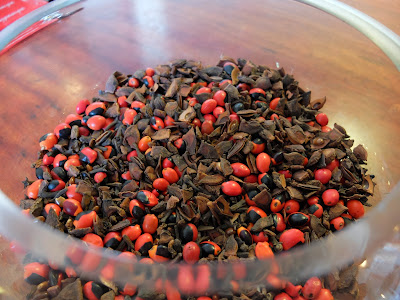
Scientific Name: Halenia weddelliana
Common Name: “Deer’s Antlers”
Family: Gentianaceae
Where: On the way to Salcantay pass.
Notes: Saw this before the pass but not after passing over the pass heading north.
Links: Wikipedia, EOL, Tropicos
Halenia Near the Salkantay Pass [13.3837 S, 72.5697 W]![Halenia Near the Salkantay Pass [13.3837 S, 72.5697 W] Halenia Near the Salkantay Pass [13.3837 S, 72.5697 W]](https://blogger.googleusercontent.com/img/b/R29vZ2xl/AVvXsEjgOJvBEc7yvpv9FvyTxTNPlpuD1M9LnW_zki5yFQOS2Oud_-7VLbNWwG9-q4zcKFYHOVVMGUWQnQ5Ht_AnPsRMNKA2y2wUY8ZdCiHq_FmGDuB1XSZU1bkcM5hK77pnFcUAJPqnFTEpOnc/s400/Halenia+sp.+03.JPG)
Scientific Name: Chersodoma ovopedata
Common Name:
Family: Asteraceae
Notes: Common before and after the pass, but only in alpine-like conditions, not lower. Found only in the Andes.
Links: Wikipedia, EOL, Tropicos
Chersodoma ovopedata at Salkantay Pass, Plant with Flower [13.3622 S, 72.5612 W]
Scientific Name: Senecio canescens
Common Name:
Family: Asteraceae
Notes: Rigid, velvety upright leaves, first spotted at Abra [“pass”] Salcantay.
Links: Wikipedia [es], EOL, Tropicos
Senecio canescens at Salkantay Pass
Scientific Name: Caiophora chuquitensis
Family: Loasaceae
Notes: Common, in clumps on way to Salcantay pass.
Links: Wikipedia, EOL, Tropicos
Scientific Name: Solanum sp.
Common Name: Papa silvestre
Family: Solanaceae
Where: Common in pastures around Salkantay Lodge.
Notes: Purple, potato flowers in threes. Saw it yesterday too.
Links: Wikipedia, EOL, Tropicos
Solanum sp.
Scientific Name: Huperzia crassa (In reference [2] as Lycopidium crassum)
Common Name: Jacapa pishqun, Jacapa ranin, Purwa-purwa
Family: Lycopodiaceae
Notes: Alpine, cushion flower. Common name mean "guinea pig penis". Common after Salkantay pass (heading northwest toward Wayra Lodge).
Links: Wikipedia, EOL, Tropicos
Scientific Name: Plantago rigida
Common Name: Tsampa estrella, Qachqa oku
Family: Plantaginaceae
Notes: Before and after Salcantay pass, common. Large mats of it, useful for crossing marshy areas.
Links: Wikipedia, EOL, Tropicos
Plantago rigida [13.3562 S, 72.5604 W]
Common Name: Tsampa
Family: Juncaceae
Notes: Before and after Salcantay pass, common. Mixed with P. rigida.
Links: Wikipedia [es], EOL, Tropicos
Distichia muscoides? with Flowers

Scientific Name: Bomarea dulcis
Common Name: Milli milli, Millish millish, Manca pacqui, Campanita
Family: Alstroemeriaceae
Notes: Red bells, in pairs or threes.
Where: On way up to Salkantay pass. Not after the pass. Near boulders.
Links: Wikipedia, EOL, Tropicos
Scientific Name: Acaena elongata
Common Name: See here: cadillo, pegarropa
Family: Rosaceae
Notes: Reminded me of avens plant I saw on the Wainwright Coast to Coast hike in England (see The Wainwright Coast to Coast Walk – A Botanical View). Ultimately, same family.
Where: At Salkantay Lodge (shrub near door) and then on way to Wayra Lodge. Typically found in pasture land.
Links: Wikipedia [es], EOL, Tropicos
Left: A. elongata Near Wayra Lodge; Center and Right: A. elongata Near Front Door of Salcantay Lodge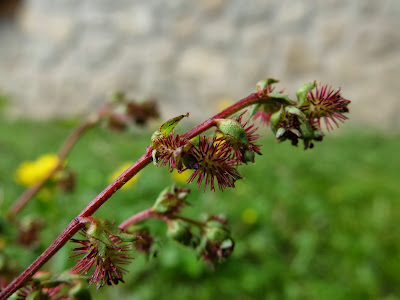
Scientific Name: Ourisia chamaedrifolia
Common Name:
Family: Scrophulariaceae
Notes: Small, tubular flowers. Just below Salcantay pass. Check here.
Links: Wikipedia, EOL, Tropicos
O. chamaedrifolia, Near Salkantay Pass [13.3621 S, 72.5612 W]
Dec 24, Wayra to Colpa Lodge
Scientific Name: Siphonandra elliptica
Common Name: Thumana
Family: Ericaceae
Notes: Didn’t see these that often.
Where: On way to Colpa Lodge. Higher elevations.
Links: Wikipedia [es], EOL, Tropicos
Siphonandra elliptica on the Way to Colpa Lodge [13.3143 S, 72.6272 W]![Siphonandra elliptica on the Way to Colpa Lodge [13.3143 S, 72.6272 W] Siphonandra elliptica on the Way to Colpa Lodge [13.3143 S, 72.6272 W]](https://blogger.googleusercontent.com/img/b/R29vZ2xl/AVvXsEj5xrr5sb8agroLqc4dpRPQGuwb_Mha84NKu8meAzqlDkTao0owejux4iXtf6cmLE_ExjU5UWEyaGzzQk6w99c9FLzCuKpMppfntv2r3cRGpQPBWVe5zJ5AYjbrSXL0HHF2CPsDtYgsoa0/s400/Siphonandra+elliptica+01.JPG)
Scientific Name: Salvia dombeyi
Family: Lamiaceae
Notes: There were a number of red dangling flowers – easy to confuse with one another at first glance. On second glance, this is unmistakably a Salvia.
Where: On way to Colpa Lodge. Lower elevations.
Links: Wikipedia, EOL, Tropicos
Salvia dombeyi [13.3171 S, 72.6414 W]![Salvia dombeyi [13.3171 S, 72.6414 W] Salvia dombeyi [13.3171 S, 72.6414 W]](https://blogger.googleusercontent.com/img/b/R29vZ2xl/AVvXsEgLPxtiUSz9NdNn1ivi9BSLt3x-cD_K33xtylnCGjMK6nLB3bnXWRwpC8qdpoORCz7BQfSEX6afyjNCDWI_CYcjvU4qZNYuq5HAS4fD0RXOJTWWQ97otwJNmgwDVrSna7MFhKhfu8FlaEE/s400/Salvia+dombeyi+02.JPG)
Scientific Name: Niphidium crassifolium
Family: Polypodiaceae
Where: On the last little climb up to the Colpa Lodge.
Links: Wikipedia, EOL, Tropicos
Niphidium crassifolium - back for frond with sori, [13.3231 S, 72.6658 W]![Niphidium crassifolium [13.3231 S, 72.6658 W] Niphidium crassifolium [13.3231 S, 72.6658 W]](https://blogger.googleusercontent.com/img/b/R29vZ2xl/AVvXsEi6bnzQ9QIOyrxFvbOKnleWUreLgEUPunjvKoYhfma4ZrmS4BrK7XFkbS0WKol7KS7sy9zjMKumYty1oGoVQrCNg8Kxxt7iz5YypL7G7WeZSfOsyPpu1svWKmrV9r5s2jw3OOn3Q_ekO_s/s400/Niphidum+crassifolium+01.JPG)
Scientific Name: Oreocallis grandiflora
Common Name: Chacpa
Family: Proteaceae
Notes: Saw it off the trail; didn’t get close.
Where: 1/2 way to Colpa Lodge.
Links: Wikipedia, EOL, Tropicos
Oreocallis grandiflora Looking East Up the Ravine We Followed Down From Wayra Lodge [13.3229 S, 72.6518 W]![Oreocallis Looking East Up the Quebrada We Followed Down From Wayra Lodge [13.3229 S, 72.6518 W] Oreocallis Looking East Up the Quebrada We Followed Down From Wayra Lodge [13.3229 S, 72.6518 W]](https://blogger.googleusercontent.com/img/b/R29vZ2xl/AVvXsEj9UseyPzf_D_RE7FK_22irfJFf9eIYKqWdgEXfaxyKOCVJgb1w7m7-XYcdzI40DEF2tzgYYPglWXVI7S8-StKzFmGky4KsgdCQ96_O4OGw6oWRuD4JRLsm3dlrdhjgdtNh48oI3tj6Z24/s400/Oreocallis+02.JPG)
Scientific Name: Salvia scutellarioides
Family: Lamiaceae
Notes: Saw it quite frequently.
Where: Second 1/2 of the trail from Wayra to Colpa Lodge.
Links: Wikipedia, EOL, Tropicos
Salvia scutellarioides [13.3236 S, 72.6548 W]![Salvia scutellarioides [13.3236 S, 72.6548 W] Salvia scutellarioides [13.3236 S, 72.6548 W]](https://blogger.googleusercontent.com/img/b/R29vZ2xl/AVvXsEgqFLC3j_flGVSyp4MoIUBsJm4pD7lclDrTNECsXekT3uw2BOXE-q2sQ1fCiEhL7txXQ9H9s41lejwRdGClxRLm1CDXNAHvAeCXqfriXCfckbQU2tLAYUqS8EnNMjcBA7ABm9a0cR1Bqyg/s400/Salvia+scutellarioides++01.JPG)
Scientific Name: Brachyotum rostratum
Family: Melastmataceae
Notes: Saw it early on without purple part at higher elevations, and later at lower elevations, more mature, with purple. Our guide said that birds pierce the flower to get to the nectar.
Where: All of trail to Colpa Lodge.
Links: Wikipedia, EOL, Tropicos
Brachyotum rostratum – [13.319 S, 72.611 W]
Scientific Name: Bomarea sanguinea
Common Name: Bomarea
Family: Liliaceae
Notes: Very plentiful along the trail
Where: On the way from Wayra to Colpa Lodge, closer to Colpa.
Links: Wikipedia, EOL, Tropicos
Bomarea sanguinea - [13.3199 S, 72.6447 W]
Scientific Name: Fuchsia boliviana var. typica
Common Name: Chimpu-chimpu.
Family: Onagraceae
Notes: Relatively plentiful.
Where: Route to Colpa Lodge.
Links: Wikipedia, EOL, Tropicos
Fuchsia boliviana - [13.3233 S, 72.6655 W]![Fuchsia boliviana - [13.3233 S, 72.6655 W] Fuchsia boliviana - [13.3233 S, 72.6655 W]](https://blogger.googleusercontent.com/img/b/R29vZ2xl/AVvXsEixsf5iqDPZF8lLUr3wix3mAFeGUINM3kE04nMBVIajeP1hzQERrFDqyTHZbaMbn9E8vqbymRHnW89uCBymdFTensfBjwhR1r7eBhsnlIaN8U12Zw4GflsIHR1xKfUg21roGE4qrZ-5mtg/s400/Fuchsia+boliviana+01.JPG)
Scientific Name: Epidendrum syringothyrsus
Common Name:
Family: Orchidaceae
Where: On climb up to Colpa Lodge after we crossed a bridge over ravine. Then, again at Wayna Picchu.
Notes: In shadier locations
Links: Wikipedia, EOL, Tropicos
Left and Center: [13.3231 S, 72.6657 W]; Right: [13.1569 S, 72.5461 W]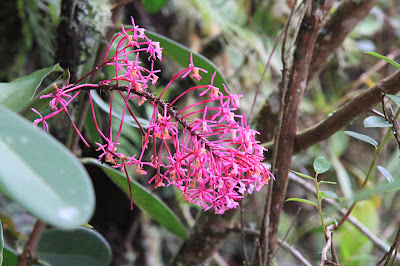
Scientific Name: Monnina
Family: Polyganaceae
Notes: Blue little flowers at first that open to expose yellow. First thought it was a vine and then realized it could get bigger: Reference [1] has entries for M. pachycoma and M. salicifolia.
Where: On trail to Colpa Lodge, and then subsequent days. The lower we went, the more in bloom it was, and the more you could observe the yellow part of mature flowers.
Links: Wikipedia, EOL, Tropicos
Left: Monnina Inflorescence Immature [13.3211 S, 72.6468 W]; Center: Monnina Inflorescence More Developed; Right: Monnina Flowers Showing Yellow [13.3234 S, 72.6624 W]
Scientific Name: Verbena litoralis
Family: Verbenaceae
Notes: Didn’t see that much of this plant.
Where: On trail to Colpa Lodge.
Links: Wikipedia, EOL, Tropicos
Verbena litoralis – Salcantay Route [13.3211 S, 72.646 W]![Verbena litoralis – Salcantay Route [13.3211 S, 72.646 W] Verbena litoralis – Salcantay Route [13.3211 S, 72.646 W]](https://blogger.googleusercontent.com/img/b/R29vZ2xl/AVvXsEiRaFnQ4-Z-2VBmZQ6gsQpaWpD7ZINnzlNJAQiNtX95xBw5jUHeV0ybYXQYVIeY6vm6r-GL6EkLtlMTjfDGZewFYybZcWQ8MVlVa7Nks04KcKMiWzpsR05byG2yM9ETdyirBu-UOuw2s44/s400/Verbena+litoralis+01.JPG)
Scientific Name: Senna birostris
Common Name: Mutuy
Family: Fabaceae
Notes: Single tree, none others seen.
Where: On the trail to Colpa Lodge, near Sitio Arqueologico Andenes
Links: Wikipedia, EOL, Tropicos
A Farmer by a Senna birostris
Scientific Name: Agalinis lanceolata
Family: Orobanchaceae
Where: On the trail to Colpa Lodge.
Links: Wikipedia, EOL, Tropicos
Agalinis lanceolata Flowers [13.3206 S, 72.6455 W]![Agalinis lanceolata Flowers [13.3206 S, 72.6455 W] Agalinis lanceolata Flowers [13.3206 S, 72.6455 W]](https://blogger.googleusercontent.com/img/b/R29vZ2xl/AVvXsEh0h3XBj4lxfzg1SObdge9z6nnhA4Tq9zZtnaLhD94En5AlVhQJSpsp_lsa6woSWzzhJy_9gFPbObfraqCSVpySathUwbs26QYNNJzuWBCpCqGJAy7QsoXWF6m369-N23tRV95vIg3LShE/s400/Agalinis+lanceolata+02.JPG)
Scientific Name: Duranta armata
Common Name: Tancar
Family: Verbenaceae
Where: On way to Colpa, at Colpa Lodge.
Notes: Wasn’t sure what this plant was for quite some time.
Links: Wikipedia, EOL, Tropicos
Three Photos of Duranta armata, leaves and flowers and berries. Photo on right at [13.3233 S, 72.6574 W]
Scientific Name: Barnadesia caryophylla
Family: Asteraceae
Where: About 45 minutes up the ravine from the Colpa Lodge.
Notes:
Photo: See Mark's photos.
Links: Wikipedia, EOL, Tropicos
Barnadesia caryophylla Leaves and Flower [13.3216 S, 72.6478 W]
Scientific Name: Telipogon antisuyense
Family: Orchidaceae
Where: In "Orchids of Collpapampa" garden.
Links: Wikipedia, EOL, Tropicos
Telipogon at Orchids of Collpapampa Garden [13.3218 S, 72.6650 W]![Telipogon at Orchids of Collpapampa Garden [13.3218 S, 72.6650 W] Telipogon at Orchids of Collpapampa Garden [13.3218 S, 72.6650 W]](https://blogger.googleusercontent.com/img/b/R29vZ2xl/AVvXsEho16fn83HavggD-Ri3BS1JAaU7es7yt2fWuLLLuxve27QupVW5dYrlAIZeL27JWT3Nns8N9yc0c8Eg_jGVoA4EFCqXDpJxcg7KoDlp0BxdDEjMmqQqFQBXeVVkd7v3BpFrk8CA9-ZYoa4/s400/Telipogon+02.JPG)
Scientific Name: Pleurothallus cordata
Common Name:
Family: Orchidaceae
Where: : In "Orchids of Collpapampa" garden. Also, one at Machu Picchu.
Links: Wikipedia, EOL, Tropicos
Left: Pleurothallus at Orchids of Collpapampa Garden [13.3218 S, 72.6650 W]; Right: Pleurothallus at Machu Picchu
Scientific Name: Lepanthes pubicaulis
Family: Orchidaceae
Where: In "Orchids of Collpapampa" garden.
Links: Wikipedia, EOL, Tropicos
Lepanthes at Orchids of Collpapampa Garden
Scientific Name: Stelis sp. (quinquinerve?)
Family: Orchidaceae
Where: In "Orchids of Collpapampa" garden.
Links: Wikipedia, EOL, Tropicos
Stelis at Orchids of Collpapampa Garden 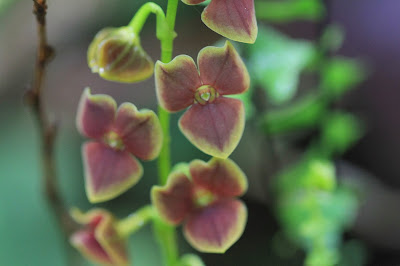
Scientific Name: Solanum, Ipomoea, Musa, Phaseolus
Family: Solanaceae, Convolvulaceae, Musaceae, Fabaceae
Notes: Starches. Potatoes, sweet potatoes, plantains, and beans before and after cooking. This was part of special Christmas Eve lunch.
Left and Center: Colpa Lodge Lunch Items; Right: Example of Dehydrated Potatoes and Coca Leaves at Wayra Lodge
Dec 25, Colpa to Lucma Lodge
Scientific Name: Cobaea scandens
Family: Polemoniacea
Where: Just outside of La Playa.
Notes: Vine, roadside.
Links: Wikipedia, EOL, Tropicos
Cobaea scandens – Just Outside of La Playa [13.2143 S, 72.6181 W]
Family: Lamiaceae
Where: East side of Santa Teresa Valley
Notes: Side of a dirt road. Can’t help but notice the bright orange of this mint family plant. Later, we learned that some smoke parts of this plant for an effect similar to cannabis. Native to Africa.
Links: Wikipedia, EOL, Tropicos
Leonotis nepetifolia Flowers. Left: [13.299 S, 72.6501 W]; Right: [13.2896 S, 17.6433 W]
![Leonotis nepetifolia Flowers. [13.299 S, 72.6501 W] Leonotis nepetifolia Flowers. [13.299 S, 72.6501 W]](https://blogger.googleusercontent.com/img/b/R29vZ2xl/AVvXsEjIRBCbJJqL-WR2JeZh_IBajeFbdFOn1DK9VilunjZOzFFVegExIXhverT6sLkMa3Z4oR7yvBSUJSiK26KqMR_mNHC3CDZ5DzpNOlczTANBcU3A5Rr2zy619i860FuDc99tz6DmVCWpD2w/s400/Leonotis+nepetifolia+01.JPG)
![Leonotis nepetifolia Flowers. [13.2896 S, 17.6433 W] Leonotis nepetifolia Flowers. [13.2896 S, 17.6433 W]](https://blogger.googleusercontent.com/img/b/R29vZ2xl/AVvXsEi_xV77NP1cjcSFeBQZHu7R4cvpdfC3T7PLfX7sMbhHVmjd73v1EzA2CrNpCgSvsJPOUGRq7TP3putE9DdyFxmvIkpKrmPXZ_pl2eJ9AqJ23wL2cMv9MYznA2V_aBtUuv9dm_WV-l9rUiM/s400/Leonotis+nepetifolia+02.JPG)
Scientific Name: Lupinus sp. (Lupinus paniculatus?)
Common Name: Tarwi or chocho.
Family: Fabaceae
Where: Hike from Wayra to Lucma Lodge.
Notes: Like what we see in the northwest, but larger, more a permanent shrub. From reference [3], in the Sanctuary of Machu Picchu, there are at least 5 species and they are difficult to distinguish. Reference [1] has an entry for Lupinus paniculatus.
Links: Wikipedia, EOL, Tropicos
Examples of Lupinus Along the Salcantay Trek
Left: Lupinus Spike [13.3002 S, 72.6543 W]; Rights: Lupinus Shrub at Colpa Lodge
Scientific Name: Oxalis urubambensis
Family: Oxalidaceae
Where: In eroded, exposed bank along road as we walked down Santa Teresa valley, east side. Also, previous day in walk to Colpa Lodge.
Notes: Reference [3] gives the name Oxalis san-miguelli subsp. urubambensis.
Links: Wikipedia, EOL, Tropicos
Left: Oxalis urubambensis – [13.2979 S, 72.6484 W]; Right: Oxalis urubambensis [13.3144 S, 72.627 W]![Oxalis urubambensis [13.3144 S, 72.627 W] Oxalis urubambensis [13.3144 S, 72.627 W]](https://blogger.googleusercontent.com/img/b/R29vZ2xl/AVvXsEj2rarNXZlfOS56WxKU73IxMJQFeuJjH_Pvu_2YdpJ_QUgQzmi81jWGmj1PCycwVmH2n_Px7mdgJgSGIH_0cCm4cysQ1VLRBjbiYhnpa4Up3qvBKpDcFqV_muwRruBT3S3OYMdizfoYUdY/s400/Oxalis+urubambis+02.JPG)
Scientific Name: Piper elongatum
Common Name: Moco Moco (tree)
Family: Piperaceae
Where: Around Colpa and on the way to Lucma Lodge.
Notes: One of our guides said that this plant is used on animal (livestock) wounds inflicted from vampire bats.
Links: Wikipedia, EOL, Tropicos
Scientific Name: Bocconia integrifolia
Family: Papaveraceae
Where: Around Colpa Lodge, roadside as we walked to Lucma Lodge. Santa Teresa Valley.
Notes: Strange inflorescence.
Links: Wikipedia, EOL, Tropicos
Bocconia integrifolia Left: [13.2928 S, 72.6447 W] on the Road to Lucma Lodge; Right: Near Colpa Lodge
Scientific Name: Cyphomandra betacea
Common Name: Tamarillo "Tree Tomato"
Family: Solanaceae
Where: In La Playa gardens. Also, on the way down to the Rio Ahobamba/
Notes: Our guide pointed these out and Said his grandmother used to make a jam from these, which was one of the reasons he liked visiting his grandmother.
Links: Wikipedia, EOL, Tropicos
Left: Tamarillo Near a House on the Trail Down from Llaqtapata to the Ahobamba River; Center: Tamarillo Tree Near La Playa [13.225 S, 72.6262 W], Right: Tasting Tamarillo [13.2206 S, 72.6215 W]![Tasting Tamarillo [13.2206 S, 72.6215 W] Tasting Tamarillo [13.2206 S, 72.6215 W]](https://blogger.googleusercontent.com/img/b/R29vZ2xl/AVvXsEhHMMXRWu7L-I4xNbh375AhdVZvqd6TY1Cl3IB0yIZBCXr_HNmrmBJR5b_Zy-U_IrrOg3Qv93Yh2UmvT2Jp_0dQnlRnVzi_JhNu1Qxav_xMq4s7f4lOU36gR3HzPT6hf60sL3r2IkdmKnI/s400/Cyphomandra+betacea+03.JPG)
Scientific Name: Xanthosoma spp.
Common Name: Uncucha
Family: Araceae
Notes: We saw this a lot after La Playa, around farms.
Where: La Playa to Lucma Lodge.
Links: Wikipedia, EOL, Tropicos
Xanthosoma Growing Along an Inca Trail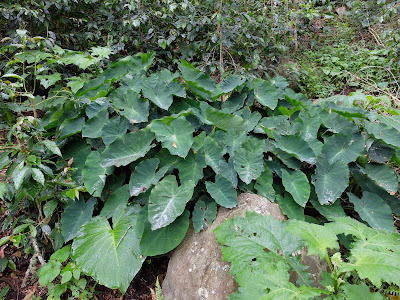
Scientific Name: Elleanthus sp.
Family: Orchidaceae
Notes: Seems to be out of blooming season.
Where: On trail from Lucuma Lodge to idroelectrica station.
Links: Wikipedia, EOL, Tropicos
Left: Ellanthus near Colpa Lodge; Center and Right: Ellanthus [13.2072 S, 72.6114 W]![Ellanthus [13.2072 S, 72.6114 W] Ellanthus [13.2072 S, 72.6114 W]](https://blogger.googleusercontent.com/img/b/R29vZ2xl/AVvXsEgyZSQ4-rgDrk4_Mp-Ubu2rRjMnfiZ4IcMrAHnu3VL6wxGcL4qUuRy1EL91wGn3sbftWNcP68T9yHBPSLNzpdm0_-DUzlBzbbXg-pkwijIrBuTzJsSxszoyioY_rMgR9Nk40ye9PR_wPdo/s400/Elleanthus+03.JPG)
Scientific Name: Tagetes minuta
Common Name: Huactay, wakatay
Family: Asteraceae
Notes: The guinea pig we had at Colpa Lodge was stuffed with this as well some of the salsas where made from it.
Where: On coffee farm we visited near Lucma Lodge.
Links: Wikipedia, EOL, Tropicos
Tagetes minuta on a Coffee Farm near Colpa Lodge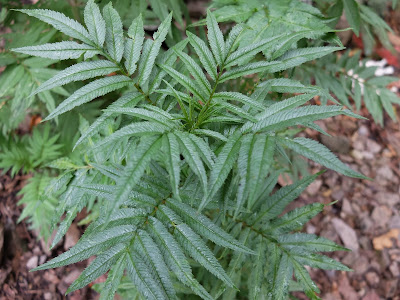
Scientific Name: Tillandsia fendleri
Common Name: Bromeliad
Family: Bromeliaceae
Notes: Saw this in a tree from a distance. See Mark's photos.
Where: On way to Lacuma Lodge, before La Playa.
Links: Wikipedia, EOL, Tropicos
Left: Tillandsia fendleri at Lucma Lodge; Right: Tillandsia fendleri in a tree [13.2208 S, 72.6218 W]
Scientific Name: Collaea speciosa
Common Name: huayna picchu?
Family: Fabaceae
Where:
Notes:
Links: Wikipedia, EOL, Tropicos
Scientific Name: Agave americana
Common Name: El Maguey
Family: Asparagaceae
Where: Santa Teresa valley.
Notes: Used as a fence along the Inca trail near the Lucma Lodge.
Links: Wikipedia, EOL, Tropicos
Left: Agave Used as a “Fence” Along an Inca Trail; Right: Patterns on Agave Leaves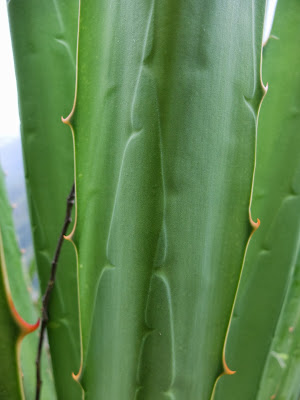
Scientific Name: Caffea arabica
Family: Rubiaceae
Where: On a coffee farm near Lucma Lodge.
Notes: We sampled some coffee, fresh-roasted by the owner.
Links: Wikipedia, EOL, Tropicos
Caffea arabica Berries and Flowers Near Lucma Lodge [13.208 S, 72.6114 W]
Dec 26, Lucma Lodge to Machu Picchu Pueblo
Scientific Name: Epidendrum secundum
Common Name: Wiñay wayna (“forever young”)
Family: Orchidaceae
Where: Leaving Lucma lodge and heading north along the Santa Teresa Valley
Links: Wikipedia, EOL, Tropicos
Scientific Name: Cyrtochilum volubile
Family: Orchidaceae
Notes: In shade, near water.
Links: Wikipedia, EOL, Tropicos


Scientific Name: Passiflora
Family: Passifloraceae
Where: On way to Llactapata from Lucma Lodge, Santa Teresa Valley, east side.
Notes:
Links: Wikipedia, EOL, Tropicos
Scientific Name: Siparuna
Family: Siparunaceae
Notes: Love the citronella-smelling red fruits.
Links: Wikipedia, EOL, Tropicos


Scientific Name: Inga feuillei
Common Name: Pacay (Ice Cream Bean)
Family: Fabaceae
Where: Near "waterfall" after crossing bridge.
Notes: A grove of them on private property we crossed over.
Links: Wikipedia, EOL, Tropicos
Scientific Name: Cecropia
Common Name: Toroq/Toroc
Where: Along the Ahobamba river
Notes: In bloom, along the Ahobamba river. Candelabra-like branching.
Links: Wikipedia, EOL, Tropicos
Scientific Name: Dodonaea viscosa
Family: Sapindaceae
Notes: Has bracts. Identified this from reference [1].
Where: Just before climbing up pass to Llactapata, on Santa Teresa Valley side.
Links: Wikipedia, EOL, Tropicos
Dodonaea Bracts 
Dec 27, Machu Picchu
Note: In the next two days we had less time to observe plants because our attention was focused on Machu Picchu!
Scientific Name: Puya herrerae
Family: Bromeliaceae
Where: At Machu Picchu.
Notes: Sticking blue flowers.
Links: Wikipedia, EOL, Tropicos
Puya herrerae at Machu Picchu
Scientific Name: Erythrinia sp.
Common Name: Pisonay
Family: Fabaceae
Where: Machu Picchu, smack in the middle. Get’s in everyone’s photos!
Notes: Our guide said that Hiram Bingham arrived at Machu Picchu, it was covered in these trees. There is one large one left in the park for show. Possibly Erythrinia edulis.
Links: Wikipedia, EOL, Tropicos
What are those two trees in everyone’s Machu Picchu photos? They are Cecropia and Erythrinia. Left: Image of Machu Picchu showing those two trees. Right: Erythrinia tree at Machu Picchu.
Dec 27, Wayna Picchu
Scientific Name: Masdevallia veitichiana
Family: Orchidaceae
Where: Climbing Wayna Picchu.
Notes: Reference [3] says that “wakanki” (the local name) means “you wil cry” in Quechua.
Links: Wikipedia, EOL, Tropicos
Masdevallia veitichiana on the climb up Wayna Picchu [13.157 S, 72.546 W] ![Masdevallia veitichiana on the climb up Wayna Picchu [13.157 S, 72.546 W] Masdevallia veitichiana on the climb up Wayna Picchu [13.157 S, 72.546 W]](https://blogger.googleusercontent.com/img/b/R29vZ2xl/AVvXsEjZIZ6ArrZgDK9UAGZI61TQxAmRhupz6QOjCGDGirpX5zg2MsvhiB_Ycd2O00mYJNVSm73Fvg7SmGDzQLoJ6zdcVXDDaDYWafIzvoQ_hAQRCgoO03g8PB0wIfD4RSsmKx4Ae3LW2VGFeIc/s400/Masdevallia+veitchiana+03.JPG)
Scientific Name: Bejaria aestuans
Family: Ericaceae
Where: Hanging off the side of Wayna Picchu.
Notes: Identified this from reference [4], the guide to Ericaceae of Machu Picchu.
Links: Wikipedia [es], EOL, Tropicos
Bejaria aestuans near the top of Wanya Picchu [13.1566 S, 72.5458 W]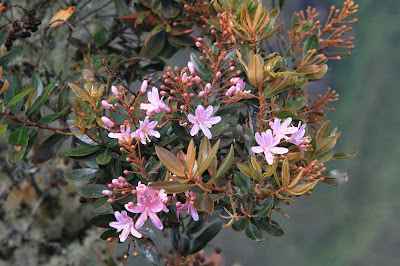














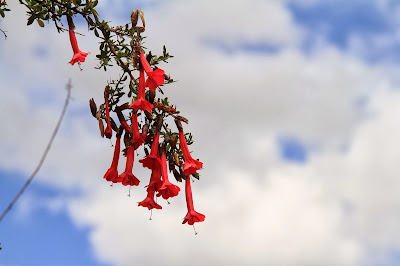

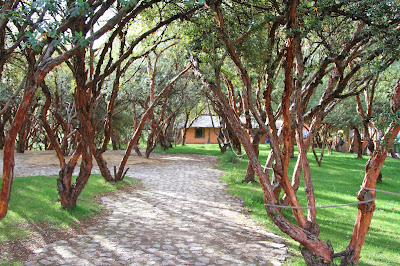



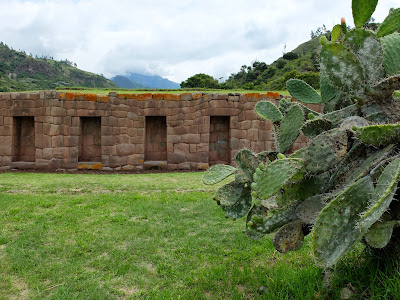



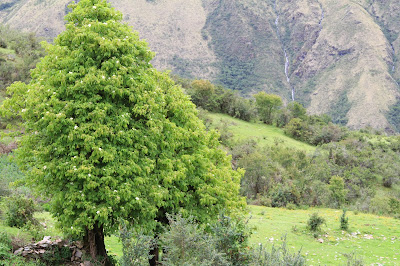


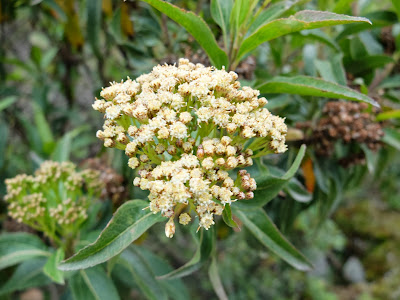













![D. spinosa Flower Inside [13.3859 S, 72.5783 W] D. spinosa Flower Inside [13.3859 S, 72.5783 W]](https://blogger.googleusercontent.com/img/b/R29vZ2xl/AVvXsEjGQxuA3DKuhSbny4DZkN3zmCakY1BC_MJw2dtprj8LyQp5MiRLL6EKPasJpQ187n3LWFx7FUl2yz_wVkGdAV9TblnRGWoqljApUIsdL2a4XkOllbB3VzVswZa3cneRtyaK74QQGVzTsCY/s400/Dunalia+spinosa+03.JPG)
![Perezia multiflora near Laguna de Humantay [13.3816 S, 72.5831 W] Perezia multiflora near Laguna de Humantay [13.3816 S, 72.5831 W]](https://blogger.googleusercontent.com/img/b/R29vZ2xl/AVvXsEiHUCMiMRcOaiTYC4q4vuvMqgydOjCRLCQ4DdziSj-EZR7ispohfdICQ_w1p3yTNkC4kMZ800vFtteU7c1mb3zT0GBJDwTlyFAD-vcomkH1GrDUnPNg7aIqMKV2uZls7zeqc23tbZetg3Q/s400/Perezia+01.JPG)
![Perezia multiflora near Laguna de Humantay [13.3816 S, 72.5831 W] Perezia multiflora near Laguna de Humantay [13.3816 S, 72.5831 W]](https://blogger.googleusercontent.com/img/b/R29vZ2xl/AVvXsEiHyOSlb1XxoCINhCw53THUap7Ae0p07cXM1Rq_JHMnuibA2T39MyTPXgIds4nxJxEkLH2dA6JMG5M9McDw_RSIMQEtDvO2u7Jlibu0ZubRY_S6IRf0K8Hbtc2Hgxo8t5W1WJzyVJgA0D8/s400/Perezia+02.JPG)
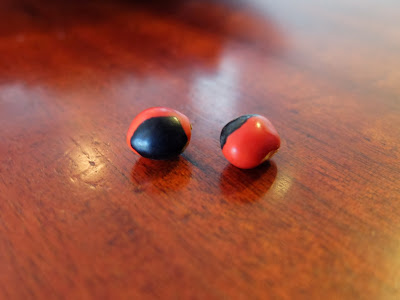
![Halenia Near the Salkantay Pass [13.3837 S, 72.5697 W] Halenia Near the Salkantay Pass [13.3837 S, 72.5697 W]](https://blogger.googleusercontent.com/img/b/R29vZ2xl/AVvXsEjTutgD6r36jMw37go275xBZiDFO6aszP-2rxwKkB21CEU81c6PRKGXOMdWElX21-h_54USnWWd7pvKZQu9icwEhLDpWVUnrVmIVhAovXCFBs0xL8kf5K4CEZZwKWZfWvx8TeKqqcWtwQo/s400/Halenia+sp.+01.JPG)
![Halenia Near the Salkantay Pass [13.3837 S, 72.5697 W] Halenia Near the Salkantay Pass [13.3837 S, 72.5697 W]](https://blogger.googleusercontent.com/img/b/R29vZ2xl/AVvXsEiTWevaI4njsMt_eI0uaQOuEn6HwnkzTwmwJwsuAiQol9eMxKxIaHC-jCwvdDhsa-qmpBqWTZQyJVwDn4sZJhli9fRpWQ78-O2yIBMtjyoUdkIB8sgPpJ1mh7Aij9B1A4TQWnE0ZJJiae0/s400/Halenia+sp.+02.JPG)

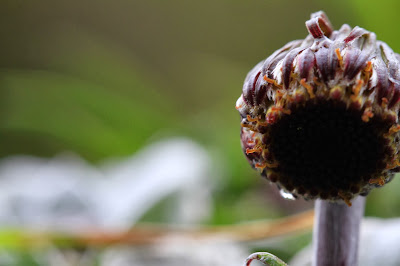








![Plantago rigida [13.3562 S, 72.5604 W] Plantago rigida [13.3562 S, 72.5604 W]](https://blogger.googleusercontent.com/img/b/R29vZ2xl/AVvXsEhb5w_W2ZXOFm7I-gSUwdnLMjeQzPZEBfunfXX1U7HTZeHpUtu9unzZvHDfckVU04kcchq8C5vfAOSZ5hCRPs2s2o3dceOHePmNmT61imgk9OlH268csDpRLo85dRAq6c-Vq2ywl4k0VMc/s400/Plantago+rigida+01.JPG)



![O. chamaedrifolia, Near Salkantay Pass [13.3621 S, 72.5612 W] O. chamaedrifolia, Near Salkantay Pass [13.3621 S, 72.5612 W]](https://blogger.googleusercontent.com/img/b/R29vZ2xl/AVvXsEhHwbTRex7ypcQtwOm3QG-xnr_5-o2pOEBuBfV5r94Yxfl430sUSyYElY3NESkKx1vIXWyckfkd_91uQXCvLjH-vR364ANCtcLJ0-lCXv6gJB5BNkHzp196zRW1r2zsWu_dCwGwg_c2dpo/s400/Ourisia+chamaedrifolia+01.JPG)
![O. chamaedrifolia, Near Salkantay Pass [13.3621 S, 72.5612 W] O. chamaedrifolia, Near Salkantay Pass [13.3621 S, 72.5612 W]](https://blogger.googleusercontent.com/img/b/R29vZ2xl/AVvXsEjTBkEmHZ02DUdr2T2VlWwr8laRxYMpbvtrUZ-KJZN17DKdRGI8B35QVA2Apy32jgBmYos7WMcNcGyLpfU1tZCAjHQDMm8V60H7fgseugnz8P9Cu7kWFQ_j4hcNHYQhJhhrP4ZLoGHzjV0/s400/Ourisia+chamaedrifolia+02.JPG)
![Salvia dombeyi [13.3171 S, 72.6414 W] Salvia dombeyi [13.3171 S, 72.6414 W]](https://blogger.googleusercontent.com/img/b/R29vZ2xl/AVvXsEj_XgTW_758vum0jV2SfT_WxilX23_8KO0teMxm4shEK0R8_fs3qrXT2Hve_vqiqKejO-uEI59WFrk2N9nbBra_oE4R3UJBjgYQbw2prz6SBm2A5DBdYk3pmWngM3M4b-tF1tL6SKBd3GU/s400/Salvia+dombeyi+01.JPG)
![Oreocallis Looking East Up the Quebrada We Followed Down From Wayra Lodge [13.3229 S, 72.6518 W] Oreocallis Looking East Up the Quebrada We Followed Down From Wayra Lodge [13.3229 S, 72.6518 W]](https://blogger.googleusercontent.com/img/b/R29vZ2xl/AVvXsEjZ1pGTE4QDQlSr522B3kgAEbhz7SlGqVPi2xvBKbROuxic9ZS1xuNOcii4mFo50RRtNqULusP-r9ia5bcL9MtwaE3UtjuTWu3ujiROHMkL_EJ1MrSLjYQQecS_4X4cEZrg-xnTijv-8zQ/s400/Oreocallis+01.JPG)
![Brachyotum rostratum – [13.319 S, 72.611 W] Brachyotum rostratum – [13.319 S, 72.611 W]](https://blogger.googleusercontent.com/img/b/R29vZ2xl/AVvXsEhuPpzHYM3ckGwhrTubEVtBs2dnCTsCK3oRo7P7c6RxeIiV3gVv4ZWCjewgUhtClqtAGRT6nG4z-p4TfXDhK3wRcr8Xm5kYi-GGhlvc3t_Wdkfeobci7Ef_l_7uplGGwT173nAERtKuh6c/s400/Brachyotum+rostratum+01.JPG)
![Bomarea sanguinea - [13.3199 S, 72.6447 W] Bomarea sanguinea - [13.3199 S, 72.6447 W]](https://blogger.googleusercontent.com/img/b/R29vZ2xl/AVvXsEhHXt4DdXiIW7-F-pFu3OPYJeEaAeBligSN0-NTXan0hakKnGsP3O9MiVEM-hzU3OPLN4TKsST_lmpYoXk_Eeo6B0V2hm6qGA39jPl5V7LNRru-g5Cn5m1aHaOHy8AmHX564pts_hFAePQ/s400/Bomarea+sanguinea+01.JPG)
![Bomarea sanguinea - [13.3199 S, 72.6447 W] Bomarea sanguinea - [13.3199 S, 72.6447 W]](https://blogger.googleusercontent.com/img/b/R29vZ2xl/AVvXsEgTTrsWTwokEjwelIVAGTMiYCB-dG6lO9Ms3EPqSXzy3OUGVbyzh0bcXUjFLlhMFzaAzyAJKm3sfe28o8zG8l14oOvV0AMftz3XvuaKXpyRog-4veNyB6RHHq-mNNaRzlnPT6pvxa5-wPo/s400/Bomarea+sanguinea+02.JPG)


![Monnina Inflorescence Immature [13.3211 S, 72.6468 W] Monnina Inflorescence Immature [13.3211 S, 72.6468 W]](https://blogger.googleusercontent.com/img/b/R29vZ2xl/AVvXsEi1_qXxFF3cR5ODS9cyBnG4oO22UruFsj6DNGTEd4IM4IMaIrq8wsVB8CIRZO5_Bt53oqLqc_jBol46eBbBiOaPchKqmor8zwrEPnRvtx33-UVd2TK7liBQglY86nbPrPVlw3CstzHUetU/s400/Monnina+01.JPG)
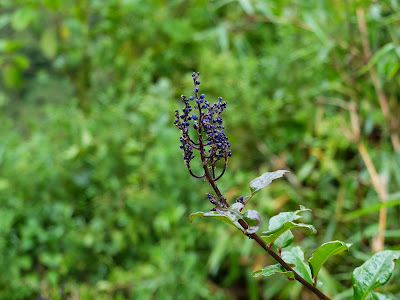
![Agalinis lanceolata Flowers [13.3206 S, 72.6455 W] Agalinis lanceolata Flowers [13.3206 S, 72.6455 W]](https://blogger.googleusercontent.com/img/b/R29vZ2xl/AVvXsEgkwF_lTunaP2Z10gBYs2FeJ8xbyRbuZAmgYmpqkZOS-ke54FbxmW4uALMkDZl2WVvJzSGpVb4rXWAHJLL_nvZabve9-Lxyp0u3GN6xyUt6SxVdfG3vrGXnGJ9IiIWIx4Lr9zZknQbq6nE/s400/Agalinis+lanceolata+01.JPG)


![Barnadesia caryophylla [13.3216 S, 72.6478 W] Barnadesia caryophylla [13.3216 S, 72.6478 W]](https://blogger.googleusercontent.com/img/b/R29vZ2xl/AVvXsEjPQtfosY71njQ6qZpTb09RifV_tY-hq_8P5lzXtEf5NqkSB4FBYYnnsg9bZS0xJ1DbWSARr7MJug8oR4zZ89XrAktI-REaQXlOjx8TsPQRk-7e1c1p4o1OD_ZtGhfQkEnX6Hffr08EnYE/s400/Barnadesia+01.JPG)
![Barnadesia caryophylla [13.3216 S, 72.6478 W] Barnadesia caryophylla [13.3216 S, 72.6478 W]](https://blogger.googleusercontent.com/img/b/R29vZ2xl/AVvXsEh2-THYDwPckmWLk9olJBISokUyJRvmlgxPQ99nJH1ma75-8dwir1-d17wwW51EgqH_Ejqi9zWNlDABhTV1er9v_vyzy71Rn6832xi4TJUl23yVRqSHJh3Xn_WzzAGcub59fVTmb6ILz6Q/s400/Barnadesia+02.JPG)
![Barnadesia caryophylla [13.3216 S, 72.6478 W] Barnadesia caryophylla [13.3216 S, 72.6478 W]](https://blogger.googleusercontent.com/img/b/R29vZ2xl/AVvXsEjClYKQAwTD2cVJb_b4pGl7FuhYbixckJmVaGWU0eRN0CfMg0Hcj7lGlhj5dr6UvkMAMHNQ3TkPALtXn6VSIlXtPJeOYjQkD3wj4VzPZ7yrbTT4E5OrHK3epgTC3RN6u4msxQrNcxsrc4g/s400/Barnadesia+03.JPG)
![Telipogon at Orchids of Collpapampa Garden [13.3218 S, 72.6650 W] Telipogon at Orchids of Collpapampa Garden [13.3218 S, 72.6650 W]](https://blogger.googleusercontent.com/img/b/R29vZ2xl/AVvXsEif-aSwvS2rPca9M-qAYJCITWiaUZmcO7SgNQgyR_C3IQoY3DGcPxJQHj0-zJB7V90P2k-qTPGJJvhYmOJIssIF7gy_RvVeqNgI0PVBRsEQwUOmRv6aQbkVF5rIhZ1iYolw6ojiCUpDC64/s400/Telipogon+01.JPG)



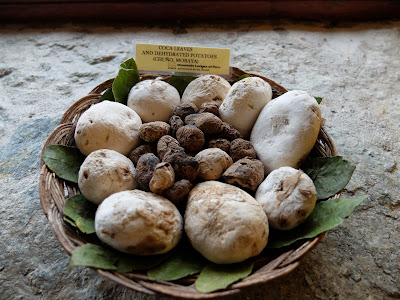
![Cobaea scandens – Just Outside of La Playa [13.2143 S, 72.6181 W] Cobaea scandens – Just Outside of La Playa [13.2143 S, 72.6181 W]](https://blogger.googleusercontent.com/img/b/R29vZ2xl/AVvXsEjjPOM__5aOjfJcSF_3YnD9jqLCVnHUyOZn4E0yncrQRAZ2QZKJcti0Lv5ezbj7ZVM2zk1md5HIveUf42BHri7-jaHFw4luBaptEgT50oyLKbGXOrOYpuKOTh4CTGp7hZD8GhyphenhyphenphCDmXT4/s400/Cobaea+scandens+01.JPG)
![Cobaea scandens – Just Outside of La Playa [13.2143 S, 72.6181 W] Cobaea scandens – Just Outside of La Playa [13.2143 S, 72.6181 W]](https://blogger.googleusercontent.com/img/b/R29vZ2xl/AVvXsEj3lVmdORgst3U2pqRz3XBN0Vi-M4FVlcyHPTLFgUhpdwRGyEZgN_l2rwhhpcH9J5gr3mR6FA5NSPeni026ZDZoq0raVWAmas_ZtxYoK1r_E4JwX0uiAbxvAip2G3TjgmXyoXWkbytDVcY/s400/Cobaea+scandens+02.JPG)
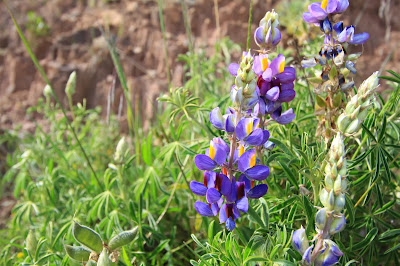
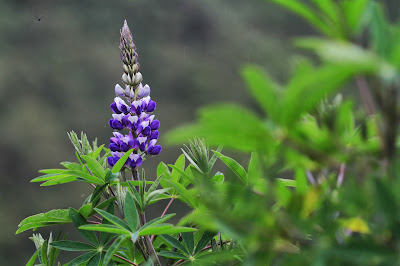
![Lupinus Spike [13.3002 S, 72.6543 W] Lupinus Spike [13.3002 S, 72.6543 W]](https://blogger.googleusercontent.com/img/b/R29vZ2xl/AVvXsEggSW4wPwpX67zE86BHljCjjEIAHKDPd6ecd14FrAcSbPA_W1tAuPVEute58EIePfNCgAXJWx50bAFtfyUZXmQ7aPdYJYQkWWEwUpYPB5rZ0GhpW8QxLdjabOkZPn_rku9p_0Z13Qn6AbQ/s400/Lupinus+03.JPG)
![Oxalis urubambensis – [13.2979 S, 72.6484 W] Oxalis urubambensis – [13.2979 S, 72.6484 W]](https://blogger.googleusercontent.com/img/b/R29vZ2xl/AVvXsEjJalzBHP5TSR86n3iKZ4TqPrfGBbvC7OF-cpjupiHLA8GHTEPUpRMLRyKRvG9CwQbCKTXP5x-gEuk0W0-7cQ5qmdzfSQGmEJzdBypy4WX9D1FObBvnw8eQIwbsG8BH9taaBL2ONajcgWw/s400/Oxalis+urubambis+01.JPG)
![Bocconia integrifolioa [13.2928 S, 72.6447 W] on the Road to Lucma Lodge Bocconia integrifolioa [13.2928 S, 72.6447 W] on the Road to Lucma Lodge](https://blogger.googleusercontent.com/img/b/R29vZ2xl/AVvXsEgNtsCyCGFcLDLg3Z5RFhJna7DjLt1lWaKDPsPsmxKz_uPmhbDOkoEsuzcENStmOgxo50ukKWikLoq0f72H0BuxbFgHJr-sdfRorPD3zf-I6jGqL_jabAmli3L2vuKSmIoiGbvyg6KA3dA/s400/Bocconia+01.JPG)

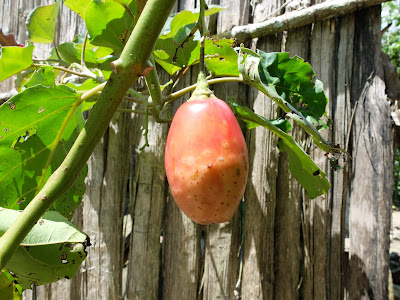
![Tamarillo Tree Near La Playa [13.225 S, 72.6262 W] Tamarillo Tree Near La Playa [13.225 S, 72.6262 W]](https://blogger.googleusercontent.com/img/b/R29vZ2xl/AVvXsEiD8pHdRho4vyBpPeSbARugm3DY_ExAixurbW6Qgx_iFAkIu7of2vmk38lbgF8nBCBACnRmdjYOuesSnTn7ZWbWJXcPyzrQOWH6XQ3mkJ976wr-k1mVt9o7rc6HogHAVQSUb-BfI8rkocQ/s400/Cyphomandra+betacea+02.JPG)

![Ellanthus [13.2072 S, 72.6114 W] Ellanthus [13.2072 S, 72.6114 W]](https://blogger.googleusercontent.com/img/b/R29vZ2xl/AVvXsEiNzpxAvT9f0k1YaGpXCpqqn4pJbWJyUKrXMHYW-VT8hLoYjRlUGHmxcRyvr1jnJhRuA0qefo9dD7D5DOJtOtkx0iLAVCbhsylVMztloKolYxIdaDo-Pcdk17EASlxHnrZVbKzx4g9Uam0/s400/Elleanthus+02.JPG)


![Tillandsia fendleri in a tree [13.2208 S, 72.6218 W] Tillandsia fendleri in a tree [13.2208 S, 72.6218 W]](https://blogger.googleusercontent.com/img/b/R29vZ2xl/AVvXsEgqiIyhT86-J_US7Vz8bKcG8MkMQx3HE2ZgUEnIt-N_dV730RmfIq21Izq6hUvClMaa0FtUYm4htYW2Yf_B7KlfIO6CMNeW8zegcc2aFF0ho59qWT3YxSxqVlDKMMmHmjqsH2eIztzX2Hg/s400/Tillandsia+fendleri+02.JPG)


![Caffea arabica Berries and Flowers Near Lucma Lodge [13.208 S, 72.6114 W] Caffea arabica Berries and Flowers Near Lucma Lodge [13.208 S, 72.6114 W]](https://blogger.googleusercontent.com/img/b/R29vZ2xl/AVvXsEjcm1QiwSF_Qkt-PVlqW0LqystmCC757qL-bjO8UYCEjTUnT2UH7vffeJbhrN4teP4ZgN8W76TPf61VyqdEcsJNj5kgPu4Id09aiWIZbgox6s4L4McGM1jxW3Ezae2_Bfx2W2zEamuqTMQ/s400/Coffea+arabica+01.JPG)
![Caffea arabica Berries and Flowers Near Lucma Lodge [13.208 S, 72.6114 W] Caffea arabica Berries and Flowers Near Lucma Lodge [13.208 S, 72.6114 W]](https://blogger.googleusercontent.com/img/b/R29vZ2xl/AVvXsEiwJAfcUhmD87zWi6nq-1i3x4EFO655oLPFFyFgiflZty8rHdDnKXHyoXo3qJ01CN4TDABiT2uLXdahgiBYhByWKEqgG_lv9uLHXm2BVOwpjxKul8D5YNzfogJPVRu8Zge2CL514U1wSn8/s400/Coffea+arabica+03.JPG)









![Masdevallia veitichiana on the climb up Wayna Picchu [13.157 S, 72.546 W] Masdevallia veitichiana on the climb up Wayna Picchu [13.157 S, 72.546 W]](https://blogger.googleusercontent.com/img/b/R29vZ2xl/AVvXsEif3jyJ6qzRIGzD_2CFpQzX9xrsugRyyzQTQMwazK8jXiLGjKwfPzBjhSdwuST8dbMCX98X4cwWnZ9nqIhd5qXExwxapUJ55Li8ZTBU8N3zlvbWRVjIW5yy1rfYS1qhawxNIdhxpZArkHA/s400/Masdevallia+veitchiana+01.JPG)
![Masdevallia veitichiana on the climb up Wayna Picchu [13.157 S, 72.546 W] Masdevallia veitichiana on the climb up Wayna Picchu [13.157 S, 72.546 W]](https://blogger.googleusercontent.com/img/b/R29vZ2xl/AVvXsEjGdEN6SkweuzW5c3y9xC0pzsxDb29jhLO8z61TegRfJ7xk2Aih-21uRbZlMm3GWGGnT8LW2q3yF_1jPclMfH9n7gMaECoK3io_24Ajha_HnCDkpaXuCJ3Y2ryC7ltzx7eFwgjqACAJoBE/s400/Masdevallia+veitchiana+02.JPG)

No comments:
Post a Comment
All comments are moderated. If your comment doesn't appear right away, it was likely accepted. Check back in a day if you asked a question.